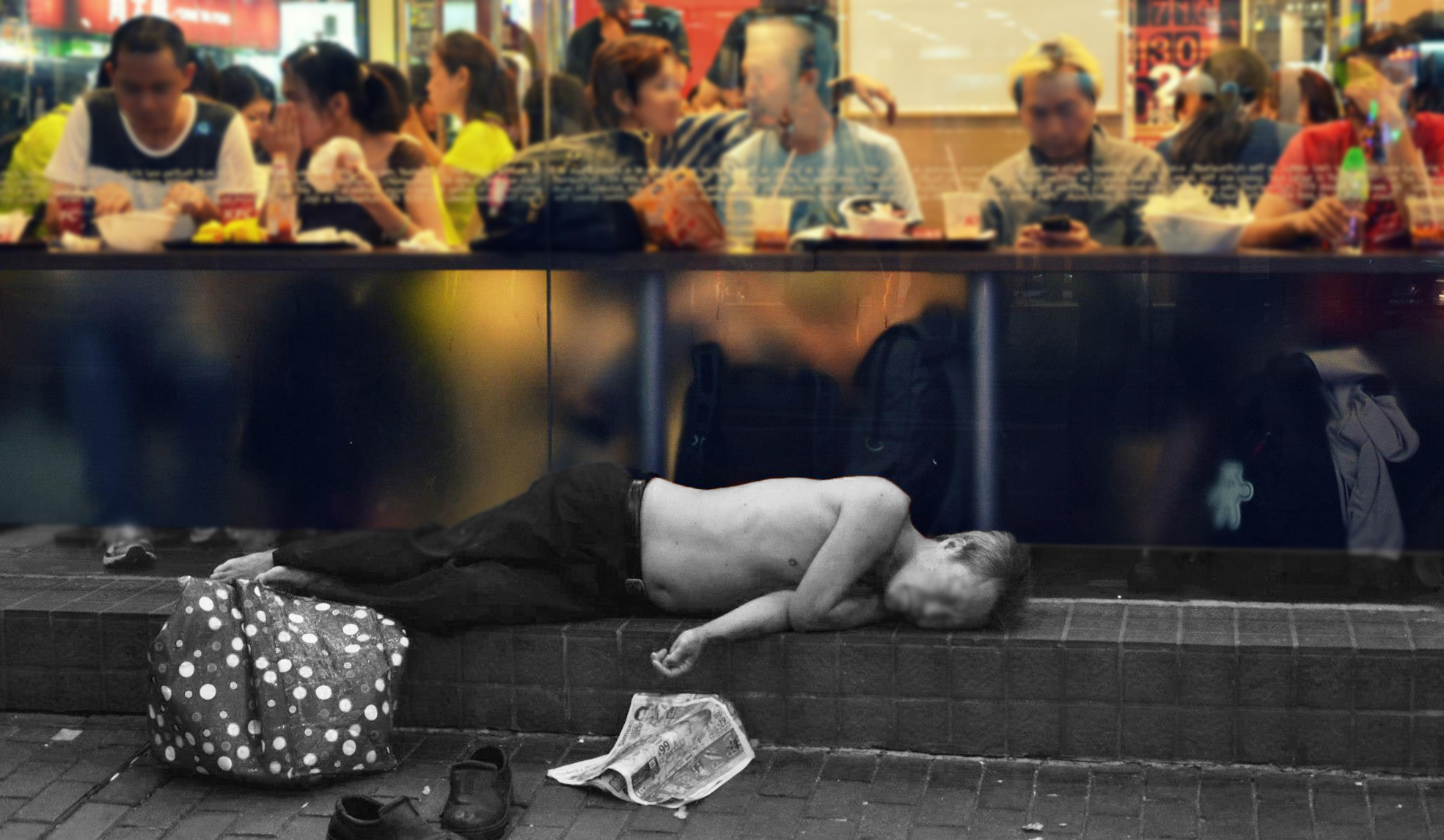Homelessness is Invisible. Voices ignored, existences criminal and abnormal, homeless people are seen as a violation of regulations to the general public, and a social problem that needs to be dealt with as soon as possible. But why are they invisible?
In this picture, the contrast between each customer in the restaurant, and the homeless man sleeping at the storefront exemplifies the dynamics of urban life in Hong Kong.
On the right side, a gentleman, with a bottle of water, seems to be very tired after a day of work. He could not afford to buy any food from the restaurant. Another man next to him just finished his meal, and he is browsing on his smartphone. The two men have been there for more than an hour; they do not show any intention to leave or go home because their home is a tiny cage room and it is extremely hot in the summer; the expensive air-conditioning bill makes staying in an AC-always-on restaurant a more economical alternative.
The couple in the middle are tourists from China. They have their backpacks with travel tags, and they do not have a place to stay at night. Since Hong Kong started to develop tourism and CEPA economic partnership with China, the cash influx and investment stimulated the housing market and economy significantly, and as a trade-off, it became the highest housing cost city in the world. (Demographia, 2017) In my observation, there are a lot of tourists from China like them sleeping in a restaurant at night.
On the left side, a father and daughter just finished their quick meal during the break of two evening tutorial classes. The educational culture with a difficult curriculum in Hong Kong forces students to take extra tutorial classes after school to boost their grades. The tutorial classes are expensive, and children have to stay outside until late night.
The sleeping man is unemployed. He has no home. Besides the photographer, no one noticed his existence. He is on his own in this long night, and vulnerable to violence, thefts, street crime, and extreme weather condition. Under the influence of neo-liberalism, people genuinely believe working hard could improve one’s life, in another word, homeless people are commonly categorized as lazy people. This notion is a “site of power” (Wooffitt, 2005) that formed social exclusion to the poor. And so, an unemployed, homeless man with an able body is sinful, typically seen as an example of unworthy poverty, is an outsider to the majority. (Becker, 1963)
Homelessness is invisible because people living in an over-crowded city are very busy and exhausted every day. A routinized non-stop lifestyle worked as a velvet cage that brought people income, but trapped people from reaching out of the window and see who is sleeping out there.(Ritzer, 2008) In a sense, this picture shows how capitalism constructed the ignorance and stereotypes of the public towards the street community and the invisibility of homeless people in the city.
---
Reference
Becker, H. S. (1963). Outsiders: Studies in the Sociology of Deviance. New York: Macmillan.
Demographia. (2017). 13th Annual Demographia International Demographia International Housing Affordability Survey: 2017 Rating Middle-Income Housing Affordability. Retrieved 01 18, 2018, from http://www.demographia.com/dhi.pdf
Ritzer, G. (2013). An Introduction to McDonaldization. In G. Ritzer, The McDonaldization of society (pp. 1-21). California: SAGE.

Commentary on Rachel Tanur's Works: Alaska Miracles